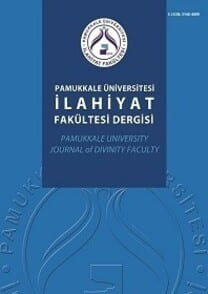MÂVERDÎ’DE SİYASET FELSEFESİ: AHKÂMU’S-SULTANİYYE ÖRNEĞİ
Basra’da dünyaya geldiği 975 yılından itibaren çok çalkantılı bir dönemi idrak ederek yaşayan Mâverdî, İslam düşünce tarihinde önemli bilim insanlarından olarak kabul edilmektedir. O, hayatı boyunca İslami ilimlerin bütün bölümlerinde değerli eserler vermiştir. Eserleri arasında en dikkat çeken Ahkamu’s-Sultaniyye’dir. Mâverdî içinde ömrünü geçirmekte olduğu toplumun temel problemleri üzerine düşüncelerini çözüm önerileri olarak ortaya koymuştur. Hilafet kavramı üzerine uygulamaları da dikkate alarak geniş değerlendirmelerde bulunmuştur. Mâverdî, halifenin seçimini, özelliklerini, görevlerini ve onu seçecek olan seçiciler kurulunun özelliklerini ortaya koymuştur. Bu hususta hassasiyetini daha ilerilere taşıyarak devlet görevlilerinin özellikleri konusunu da önemle ortaya koymuştur. Bu değerlendirmeler İslam siyaset felsefesi alanında önemli bir yer tutmaktadır. Devletin oluşumu ve sürekliliğinin sağlanması hususunda yöneticilerin en önemli vasfının adaletle hükmetmek olduğunu belirten Mâverdî, toplumun devlet olgunluğuna oluşmasında bu özelliği en önemli unsur olarak değerlendirmiştir. Devlet yöneticilerinin toplumu oluşturan bireylerin temel hak ve hürriyetlerini korumalarının gerekli olduğunu belirtir. Mâverdî’nin Ahkâmu’s-Sultaniyye adlı eseri İslâm kamu hukukuna ait ilk müstakil çalışma olarak kabul edilmektedir. O, bu eserinde yanlış uygulamalara karşı tepkisini ortaya koymakta ve temel siyaset felsefesi konusunda teorik bilgileri sunmaktadır. Onun bu eseri temel olarak anayasa, idare, maliye ve toplum içerisindeki bireylerin ilişkilerinin hukuki yönleri üzerinedir. Abstract POLITICAL PHILOSOPHY IN MÂVERDÎ: THE CASE OF AHKÂMU'S-SULTANIA Mâverdî, who has experienced a very turbulent period since he was born in Basra in 975, is regarded as one of the important scientists in the history of Islamic thought. Throughout his life, he produced valuable works in all parts of Islamic sciences. The most striking among his works is Ahkamu's-Sultaniyye. Mâverdî put forward his thoughts on the basic problems of the society in which he lived his life as solutions. He made extensive evaluations, taking into account the applications on the concept of caliphate. Mâverdî revealed the selection, characteristics, duties of the caliph and the characteristics of the electoral committee that would choose him. By carrying his sensitivity further on this issue, he has also put forward the issue of the characteristics of state officials. These evaluations have an important place in the field of Islamic political philosophy. Mâverdî stated that the most important quality of the rulers in terms of the formation and continuity of the state is to rule with justice and considered this feature as the most important factor in the formation of the state maturity of the society. He indicates that state administrators must protect the fundamental rights and freedoms of individuals who make up the society. Mâverdî's work named Ahkâmu’s-Sultaniyye is regarded as the first independent study of Islamic public law. In this work, he reveals his reaction to wrong practices and provides theoretical information on basic political philosophy. This work of his is mainly about with the constitution, administration, finance and also legal aspects of the relations of individuals in society.
___
- Mâverdî, Ebu’l-Hasen Ali b. Muhammed. el-Ahkâmu’s-Sultaniyye. Thk. İsam Faris el-Harestani - ve Muhammed İbrahim ez-Zağli. Beyrut: el-Mektebu’l-İslâmî, 1996.
- Celaleddin Devvani. Ahlâk-ı Celâlî. Trc. Ejder Okumuş. Ankara: Fecr Yayınları, 2019.
